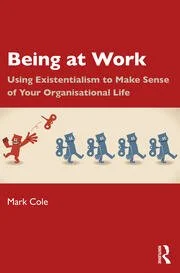How Mark approaches his work
His experience and his writing lead Mark to take a distinctively creative view of organisation development, one that offers a unique perspective.
His primary focus is not on the organisation but on organising. He attends to the networks and systems where people come together to get things done and not the structures that formally define a company.
In light of this approach and his perspective on organisational life, he will make a unique contribution, underpinned by the following four perspectives:
Rethink Leadership
Leadership is a space into which people step. It is in no way exclusively about who in a corporate structure is identified as a leader.
Traditional approaches to leadership cannot be effective in the complex context in which we find ourselves. Mark looks to support the unlearning of leadership practice and to help people to let new ways of leading emerge.
Development of leadership should not be burdened by a content-driven curriculum but by an emphasis on criticality, reflexivity, and the development of an ethical self.
Challenge the Commonplace
The busyness of business means that the space for reflection, serious thought, and coming up with ideas is either extremely limited…or, in so many cases, non-existent. This allows practices to persist without consideration as to whether they should.
Work in the workplace needs to always start with an active and critical engagement with all that is taken for granted. No stone should be unturned, no shibboleth unchallenged.
Support Voice in the Workplace
A great deal of time and effort is spent in organisations on initiatives that are supposedly aimed at involving, engaging, and empowering people in the workplace…but so often there is a gap between the theory and practice in this regard.
People in the workplace need to set aside their positions and their certainties to create circumstances where they are not just listening to one another but are genuinely hearing what the other person is saying, not in order to respond or to interpret or to contradict, but so that people invite others into dialogue.
To hear what is being said in an organisation is to refuse to reduce human experience to crude numbers, as happens with staff or pulse surveys, and to bridge the gaps that exist between us in the workplace, something often exaggerated by hierarchy.
Speak about Power
Power is spoken about in political, social and community terms - but is deemed to be undiscussable in corporate contexts. The refusal to engage around this topic ignores the crucial way in which power informs organisational life.
The starting point for any work in the workplace is to acknowledge the presence of power and encourage everyone to find ways to speak about it.
Importantly, though, the focus needs to extend beyond concentrating just on positional power, important though that is to identify and challenge - and instead to take a more nuanced and contemporary view of it, one that sees all of us in corporate life as both objects of power and vehicles for it.
Click on the book covers below to go to the publisher’s site for further details




